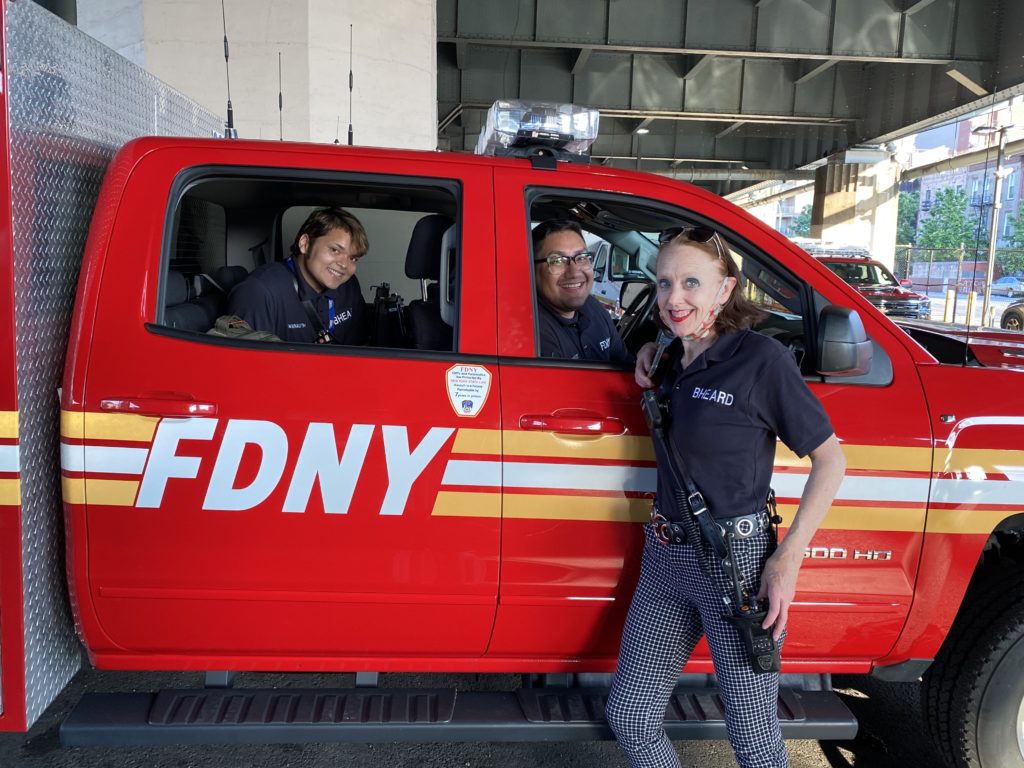New York, NY
Behavioral Health Emergency Assistance Response Division (B-HEARD) – New York, NY
June 10, 2022
The Behavioral Health Emergency Assistance Response Division (B-HEARD) in New York City launched June 2021 as a pilot program. B-HEARD is operated jointly by the Fire Department of the City of New York’s Emergency Medical Services (FDNY/EMS) and NYC Health + Hospitals, with the Mayor’s Office of Community Mental Health providing oversight. B-HEARD teams respond to a wide range of behavioral health needs, including suicidal ideation, substance misuse, mental illness, and physical health problems, which can be exacerbated by, or mask mental health concerns. Once on-scene, team members provide several services, including de-escalation, physical and mental health evaluations, and referrals to additional services. The teams can also offer emergency medical care and request emergency transportation to a hospital.
The following information outlines B-HEARD’s efforts since it began; it follows the sections of the toolkit. Readers can connect to other parts of the toolkit by clicking the headers for more details.

Photo credit: “B-HEARD”
Community Engagement and Collaboration
- The B-HEARD pilot program is a coordinated effort by New York City agencies, including the FDNY/EMS, NYC Health + Hospitals, the Department of Health and Mental Hygiene, the New York Police Department (NYPD), and the Mayor’s Office of Community Mental Health. It was formed to implement a new health-centered approach to mental health emergencies and is part of the city’s commitment to treat mental health crises as public health concerns, not public safety issues.
Call Triaging
- B-HEARD teams are dispatched through 911. Call takers within the 911 dispatch center, as well as EMS, analyze incoming calls to determine whether they include a mental health component and whether the situation is appropriate for a B-HEARD response. Upon determining that the situation is appropriate for response, a B-HEARD team is dispatched.
Program Staffing
- B-HEARD pilot teams currently operate 7 days a week for 16 hours a day in 15 New York City police precincts.
- B-HEARD teams include 2 emergency medical technicians/paramedics from FDNY/EMS and a social worker from NYC Health + Hospitals.
- Team members have experience managing mental health crises and are jointly trained in crisis response to assess and de-escalate emergency situations and other related topics.
Use of Data to Inform Decision Making
- The city has been tracking several key metrics on the B-HEARD pilot program since its launch to help inform the implementation of the initiative. Indicators related to operations (e.g., percent of calls that teams respond to out of calls that are routed to them by 911) and outcomes (e.g., percent of people who accept assistance; percent of people who are assisted onsite) are monitored frequently, and data is publicly reported on the website of the Mayor’s Office of Community Mental Health. In the first 6 months of the B-HEARD pilot program:
- 911 operators (both NYPD and EMS) routed 22 percent of mental health-related 911 calls (684 calls) in the pilot area to B-HEARD teams;
- B-HEARD teams responded to approximately 82 percent of all calls routed to them (564 total calls). The remaining calls received the traditional (NYPD/EMS) 911 response. This total does not include the number of times B-HEARD teams responded to requests from agency partners, including NYPD and EMS; and
- In 92 percent of cases, people accepted assistance from B-HEARD teams, which is higher than 87 percent for traditional (NYPD/EMS) 911 responses.
- Compared to traditional 911 responses, more people have avoided unnecessary trips to the hospital when B-HEARD teams respond to the scene.
- Only 46 percent of people assisted by B-HEARD were transported to a hospital for additional care a much lower percentage than traditional responses, in which 87 percent of people were transported to a hospital.
- Forty-seven percent of people served by B-HEARD were either assisted onsite or transported to a community-based care location. With the traditional response, these people would have had to go to a hospital to get care.
- Read B-HEARD’s Six Months of Operations Report for more information about the pilot program.
Safety and Wellness
- FDNY/EMS and NYC Health + Hospitals manage the B-HEARD teams and provide training and ongoing support.
- B-HEARD teams have the ability to respond to mental health crisis emergency calls without law enforcement, except in situations involving a weapon or imminent risk of harm to themselves and/or others.
- Once a B-HEARD team has arrived at a location, team members can request backup from NYPD if it is not safe for the B-HEARD team to intervene alone.
Financial Sustainability
- The B-HEARD program is financed through city funding allocated to FDNY/EMS and NYC Health + Hospitals with oversight by the Mayor’s Office of Community Mental Health.










